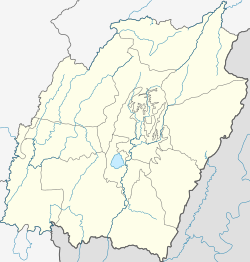Huishu
| Huishu | |
|---|---|
| Village | |
| Location in Manipur, India | |
| Coordinates: 25°14′46″N 94°33′07″E / 25.246°N 94.552°ECoordinates: 25°14′46″N 94°33′07″E / 25.246°N 94.552°E | |
| Country |
|
| State | Manipur |
| District | Ukhrul |
| Elevation | 1,699 m (5,574 ft) |
| Population | |
| • Total | 1,018 |
| Languages | |
| • Official | Tangkhul (Huishu Tui) |
| Time zone | IST (UTC+5:30) |
| PIN | 795142 |
| Vehicle registration | MN |
| Nearest city | Ukhrul Imphal City |
| Literacy | 87.91% |
| Lok Sabha constituency | Outer Manipur |
| Vidhan Sabha constituency | Chingai |
| Website | manipur |
Huishu is a village located north of Ukhrul in Ukhrul district, Manipur state, India. The village is partially connected by National Highway 150, Imphal-Kohima road via Jessami. Huishu is 40 kilometers away from Ukhrul and about 8 kilometers away from Indo-Myanmar border pillar number 125. Huishu is flanked by Poi in the North, Chingai in the north west Longpi in the west and Khamasom in the south. The inhabitants speak Huishu dialect which belongs to the Tibeto-Burman language family.
As per 2011 census, Huishu has 201 households with the total of 1018 people of which 519 are male and 499 are female. Of the total population, 133 were in the age group of 0–6 years. The average sex ratio of Huishu village is 961 female to 1000 male which is lower than the state average of 985. The literacy rate of the village stands at 87.91%. Male literacy rate stands at 93.36% while female literacy rate was 82.22%.
The village is home to people of Tangkhul Naga tribe. Majority of the inhabitants are Christians. Agriculture is the primary occupation of the inhabitants. The village is well known in the district for its scenic beauty. Being close to the porous international boundary with Myanmar, the village served as the strategic transit point for militant groups to traverse between India and Myanmmar. Before the signing of the Cease-fire agreement between the NSCN (IM) and the Government of India in 2007, the village was burned down by the Indian Army as retaliation to attacks made on them by the militants on several occasions. The most devastating one being on 11 March 1996 carnage, when the whole village including the granaries were burnt to ground by the Indian arm forces after their camp was annihilated by the NSCN (IM). Some villagers were also reportedly shot dead both in custody and in fake encounter and many were tortured.
...
Wikipedia


